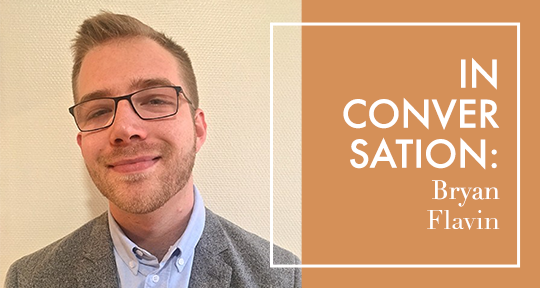Featured in the Summer 2022 issue, “The Ayah of the Throne,” by Habib Tengour, is a lyrical story that explores the French colonial power in Algeria toward the beginning of the Algerian War of Independence. The story centers around how colonial forces shaped the narrator’s experience of education, language, religion, and even how and when one can tell stories. With this vibrant and original account of his childhood, Tengour reclaims the power of storytelling and relays a life-altering moment with humor and compassion.
In his English translation, Bryan Flavin deftly captures Tengour’s voice and introduces Anglophone speakers to an important piece of writing from one of the foremost voices in contemporary Francophone Maghrebi literature. I had the opportunity to speak with Flavin over email about his experience translating “The Ayah of the Throne.” In the following interview, we discuss the intricacies of working with multilingualism, the importance of not explicating in translation, and the complex and interwoven histories of French and Arabic.
Rose Bialer (RB): I always like asking translators how they first began translating. I am even more curious in your case since you work in both French and Arabic.
Bryan Flavin (BF): I’ve always loved the precision and structure in linguistics and language studies, as well as the exploration and plurality of language in literature and creating writing. During my undergraduate education, I studied linguistics and French literature with a specialization in Arabic language and culture and ended up discovering literary translation as a sort of intersection for all my interests. I was lucky enough to take classes on French translation and global literacy toward the end of my studies and started with translating student writing with an undergraduate translation magazine I helped co-found. It was something I continued practicing on my own until deciding to pursue it in my graduate studies.
RB: You mention in your Translator’s Note that you had the chance to work with Habib Tengour during his Fall 2021 residency with the International Writing Program. This program sounds fascinating, and I would love to hear more about your experience, especially collaborating with Tengour in person.
BF: My translation program had the opportunity to pair with one of the residents to produce a translation of their work during workshop sessions devoted to each piece. Both the original writer and translator were present and active contributors during each workshop, and the balance (and sometimes friction, but in a generative way) between the author’s original intention and the translator’s means to produce something independent in the English was uniquely pronounced due to the workshop’s collaborative nature, which made for a great learning experience.

